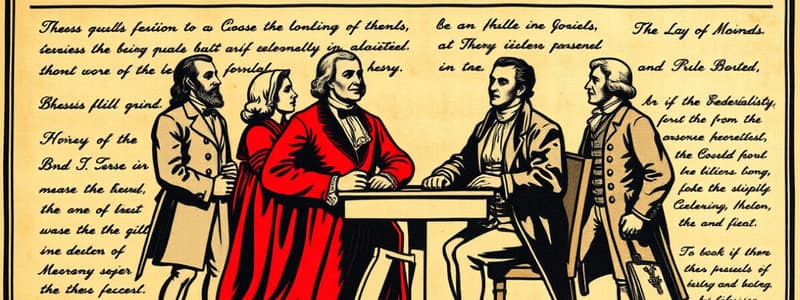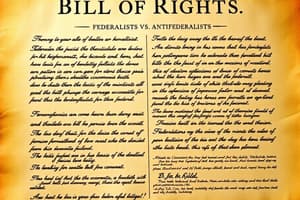Podcast
Questions and Answers
What was the main disagreement about adding a bill of rights?
What was the main disagreement about adding a bill of rights?
A bill of rights was necessary for protecting individual rights.
What did the Federalists believe regarding the Constitution and a bill of rights?
What did the Federalists believe regarding the Constitution and a bill of rights?
The Constitution alone protected individual rights, and it was unnecessary and even dangerous to list specific rights.
Why did the Anti-Federalists oppose the Constitution?
Why did the Anti-Federalists oppose the Constitution?
They argued that the Constitution gave the government too much power, so it needed to list individuals' rights.
Which amendment relates to government officials obtaining court orders to search for smuggled goods?
Which amendment relates to government officials obtaining court orders to search for smuggled goods?
What royal court in England was known for hearing cases in secret and using torture?
What royal court in England was known for hearing cases in secret and using torture?
Who was John Wilkes and what happened to him in 1762?
Who was John Wilkes and what happened to him in 1762?
What does the 8th Amendment state regarding punishments?
What does the 8th Amendment state regarding punishments?
What does the 6th Amendment require for a trial?
What does the 6th Amendment require for a trial?
What rights does the 5th Amendment guarantee?
What rights does the 5th Amendment guarantee?
What is stated about petitioning the king in the 1st Amendment?
What is stated about petitioning the king in the 1st Amendment?
What does the 2nd Amendment say about armed defense?
What does the 2nd Amendment say about armed defense?
What does the 8th Amendment specify about fines?
What does the 8th Amendment specify about fines?
Flashcards
Bill of Rights Debate
Bill of Rights Debate
The debate surrounding whether specific rights should be explicitly listed in the Constitution.
Federalist View on Bill of Rights
Federalist View on Bill of Rights
They believed the Constitution adequately protected individual rights and listing them might be dangerous or unnecessary.
Anti-Federalist View on Bill of Rights
Anti-Federalist View on Bill of Rights
They feared the Constitution gave the government too much power and advocated for explicit rights to ensure individual freedoms.
6th Amendment
6th Amendment
Signup and view all the flashcards
4th Amendment
4th Amendment
Signup and view all the flashcards
5th Amendment
5th Amendment
Signup and view all the flashcards
8th Amendment
8th Amendment
Signup and view all the flashcards
2nd Amendment
2nd Amendment
Signup and view all the flashcards
1st Amendment
1st Amendment
Signup and view all the flashcards
Star Chamber
Star Chamber
Signup and view all the flashcards
John Wilkes
John Wilkes
Signup and view all the flashcards
Right to Petition
Right to Petition
Signup and view all the flashcards
Study Notes
Bill of Rights Debate
- Disagreement over the necessity of a bill of rights focused on its role in protecting individual freedoms.
- Federalists believed the Constitution itself sufficiently safeguarded rights; they viewed a bill of rights as unnecessary and potentially perilous.
- Anti-Federalists argued that the absence of a bill of rights awarded excessive power to the government, necessitating a clear enumeration of individual rights.
Historical Context of Amendments
- 4th Amendment: Responded to colonial practices allowing government searches for smuggled goods, requiring warrants for searches.
- 5th Amendment: Established due process and protection against government abuses; rooted in historical abuses of the Star Chamber, which operated secretively and imposed severe punishments.
- 1st Amendment: Guarantees freedom of speech and press, exemplified by John Wilkes' arrest for criticism of the king in 1762.
- 6th Amendment: Protects the right to a fair trial, ensuring credible witnesses are required for prosecution.
- 8th Amendment: Addresses proportionality in fines and punishments, preventing excessive penalties for minor infractions.
Key Rights Affirmed
- 1st Amendment: Protects the right to petition the government, asserting that any legal repercussions for such actions are invalid.
- 2nd Amendment: Affirms the right of Protestants to bear arms for defense within legal boundaries.
- 8th Amendment: Prohibits excessive bail and cruel and unusual punishment, reflecting a commitment to humane treatment within the justice system.
Studying That Suits You
Use AI to generate personalized quizzes and flashcards to suit your learning preferences.




